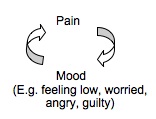Clinical Psychology and Shoulder Instability
Dr. Aoiffe Kilcommons
This page provides information about the role of a Clinical Psychologist in the management of the Shoulder Instability difficulties and how they might be able to help you.
The Effect of Shoulder Instability
If you have experienced shoulder instability for a long time then you know that it can affect all areas of your life and be very stressful. This can make it more difficult to cope with everyday problems. Often this does not only affect the person with shoulder instability, but their friends and family too.
A number of common problems include:
- Giving up activities that used to be important to you (work, hobbies).
- Struggling to try new things.
- Feeling low in mood.
- Lower self-confidence.
- Becoming more socially withdrawn.
- Feeling anxious or panicky about your shoulder problem.
- Feeling that other people do not understand your shoulder problem.
- Relationship difficulties.
- Feelings of irritability, frustration and anger.
- Feeling guilty about things that you can no longer do.
- Concerns about medication
How can a Clinical Psychologist help?
A Clinical Psychologist cannot cure your shoulder problem. However, you may already be using a number of “self-management” skills. They hope to help you build on these existing skills and to develop new ones.If you experience pain alongside your shoulder instability problem, this can often lead to problems in your mood as well, which in turn makes it harder to cope with your pain.

Clinical Psychologists can help you to become more aware of the relationship between physical health problems such as shoulder instability and your mood, and help you develop ways to improve your emotional well-being and increase your sense of control over your shoulder problem.
A Clinical Psychologist typically offers help with:
- Coming to terms with and adjustment to shoulder instability issues.
- Improving your self-management skills.
- Reducing distress related to shoulder instability.
- Helping you cope better with the emotional consequences of living with shoulder instability which may include stress related problems, low mood, low self-esteem, anger, anxiety, relationship difficulties.
- Help you cope better with possible associated chronic pain.
- Improving your communication in relation to your shoulder problem.
- Help with decision making about treatment to support your discussion with other health professionals.
- Life-style changes towards preventing deterioration of physical function and improving your quality of life.
Why might you be referred to a Clinical Psychologist?
Being referred to a clinical psychologist does not mean that your shoulder problem is not real or that it is “in your mind”. However, shoulder instability problems are complex and can affect people in a number of ways, not just physically.You may also experience pain alongside your shoulder problem. Pain is a highly personal experience, affecting each person differently and changing from day to day.
Clinical Psychologists work alongside you and other members of the shoulder management team (such as physiotherapists and surgeons) to help you cope better. They work with you to understand and enhance the helpful skills you have already to improve your well-being and quality of life for the long term.
What is a Clinical Psychologist?
Clinical psychologists work with people of different ages.This includes helping people with a wide range of physical health problems to cope with the emotional consequences of these difficulties, and to improve their quality of life.
Clinical Psychologists are different to psychiatrists. They are not medical “doctors” and they do not prescribe medication. They use a range of talking therapies to help the patients they work with.
What is the training for a Clinical Psychologist?
Clinical Psychologists have a comprehensive doctoral level training (minimum eight years). This involves gaining a three year honours degree in psychology, typically two years experience as an assistant psychologist before completing a three year accredited Doctorate in Clinical Psychology training course. Clinical Psychologists are qualified to work across the human life span (i.e. trained to treat clinical issues in children and families, adults, older adults, people with learning disabilities and more specialist areas). Their unique training and skill enables them to draw upon multiple psychological theories / therapies within a developmental framework when working to meet your individual needs. Clinical Psychologists work in line with best practice guidelines produced by National Institute of Clinical Excellence, abide by the British Psychological Society Code of Ethics and Conduct and are registered with the Health Care Professions Council (the UK regulatory body for health professionals).What will happen at your first appointment?
During your first assessment appointment, the Clinical Psychologist will talk with you about how your shoulder instability problem is affecting your life. This is likely to involve talking about different areas of your life including work, leisure, social life and relationships with friends and family. Together, you will work with the Clinical Psychologist to form a shared understanding of the issues you need to cope with and identify goals to work towards. Based on your needs, the Clinical Psychologist will decide whether psychological therapy is appropriate for you and how many sessions may be required. For many people, the focus of therapy is on factors that may be maintaining problems, working towards what you value in life and your realistic goals.Typically a series of six to sixteen appointments lasting fifty minutes are agreed with the Clinical Psychologist. There is usually homework to complete and information to read between sessions.
Dr. Aoiffe Kilcommons works with our shoulder team to assist with treating our complex patients.
For more information see her site - www.happinessinmind.com


